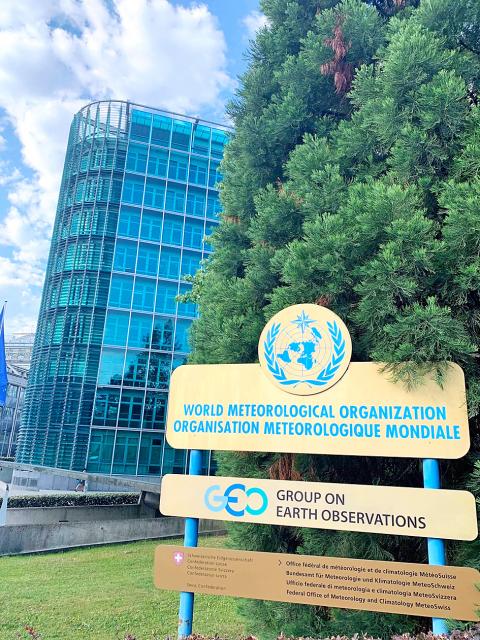Taiwanese experts were yesterday abruptly blocked from attending the World Meteorological Congress in Geneva, Switzerland, reportedly due to Chinese pressure.
Weatherrisk Explore Inc (天氣風險管理開發) general manager Peng Chi-ming (彭啟明) and Civil IoT Taiwan information platform convener Lu Chung-chin (呂忠津) were denied entry to the conference room that hosted the congress, which is held every four years, Civil IoT Taiwan wrote on Facebook. It began on Monday last week and runs through Friday.
Peng and Lu had earlier this week joined the meeting as civic observers, but their accreditation was abruptly canceled, it wrote, adding that it suspects that World Meteorological Organization (WMO) Assistant Secretary-General Zhang Wenjian (張文健) was behind the move.

Photo courtesy of Peng Chi-ming
“It is very uncomfortable to encounter such a situation on the spot in Geneva, just as a healthy person is suddenly told that he has cancer,” Peng wrote on Facebook on his way back to Taiwan.
He has Chinese friends working in the profession and they can respect each other’s values, Peng said, adding that he believes the “irrational move” was made by just a few people.
He wants to tell whoever is responsible that “although you have some power, you are losing people’s respect,” Peng wrote.
Taiwan’s representative office in Geneva had asked like-minded countries to express concern over a likely incident to the WMO, but the organization still succumbed to Beijing’s pressure, the Ministry of Foreign Affairs said in a statement.
It condemned Beijing for impeding Taiwanese experts from participating in international exchanges in professional affairs and expressed regret over the WMO’s failure to stand firm.
The Chinese government has been imposing its fictitious “one China” principle on global organizations and businesses to the level of insanity, and does not even spare international cooperation in health, climate and disaster prevention, it said.
It would continue demanding that UN-affiliated agencies rectify their biased measures against Taiwanese, the ministry added.
Chinese obstructionism is increasingly felt in global meetings on atmospheric sciences, National Taiwan University Department of Atmospheric Sciences chair Lin Po-hsiung (林博雄) said.
He attended the WMO-backed Technical Conference on Meteorological and Environmental Instruments and Methods of Observation in Belgium in 2012, but did not sign up for its last year’s edition, as Taiwan’s country code has disappeared from its application system, so he only sat in on some speeches, instead of attending as a Chinese, he said.
Taiwan has been filing its weather data with WMO’s Global Telecommunication System through an information exchange center in Tokyo, instead of Beijing, he said.
Information gathered through the Formosat-3 and Formosat-7 satellite constellations — which are Taiwan-US collaborative programs — is processed through the US, he said.
Taiwan should continue working with the US or Europe in atmospheric observations, as well as promoting joint weather studies and disaster prevention with diplomatic allies and Southeast Asian countries, Lin said.

INVESTIGATION: The case is the latest instance of a DPP figure being implicated in an espionage network accused of allegedly leaking information to Chinese intelligence Democratic Progressive Party (DPP) member Ho Jen-chieh (何仁傑) was detained and held incommunicado yesterday on suspicion of spying for China during his tenure as assistant to then-minister of foreign affairs Joseph Wu (吳釗燮). The Taipei District Prosecutors’ Office said Ho was implicated during its investigation into alleged spying activities by former Presidential Office consultant Wu Shang-yu (吳尚雨). Prosecutors said there is reason to believe Ho breached the National Security Act (國家安全法) by leaking classified Ministry of Foreign Affairs information to Chinese intelligence. Following interrogation, prosecutors petitioned the Taipei District Court to detain Ho, citing concerns over potential collusion or tampering of evidence. The

‘FORM OF PROTEST’: The German Institute Taipei said it was ‘shocked’ to see Nazi symbolism used in connection with political aims as it condemned the incident Sung Chien-liang (宋建樑), who led efforts to recall Democratic Progressive Party (DPP) Legislator Lee Kun-cheng (李坤城), was released on bail of NT$80,000 yesterday amid an outcry over a Nazi armband he wore to questioning the night before. Sung arrived at the New Taipei City District Prosecutors’ Office for questioning in a recall petition forgery case on Tuesday night wearing a red armband bearing a swastika, carrying a copy of Adolf Hitler’s Mein Kampf and giving a Nazi salute. Sung left the building at 1:15am without the armband and apparently covering the book with a coat. This is a serious international scandal and Chinese

Seventy percent of middle and elementary schools now conduct English classes entirely in English, the Ministry of Education said, as it encourages schools nationwide to adopt this practice Minister of Education (MOE) Cheng Ying-yao (鄭英耀) is scheduled to present a report on the government’s bilingual education policy to the Legislative Yuan’s Education and Culture Committee today. The report would outline strategies aimed at expanding access to education, reducing regional disparities and improving talent cultivation. Implementation of bilingual education policies has varied across local governments, occasionally drawing public criticism. For example, some schools have required teachers of non-English subjects to pass English proficiency

TRADE: The premier pledged safeguards on ‘Made in Taiwan’ labeling, anti-dumping measures and stricter export controls to strengthen its position in trade talks Products labeled “made in Taiwan” must be genuinely made in Taiwan, Premier Cho Jung-tai (卓榮泰) said yesterday, vowing to enforce strict safeguards against “origin laundering” and initiate anti-dumping investigations to prevent China dumping its products in Taiwan. Cho made the remarks in a discussion session with representatives from industries in Kaohsiung. In response to the US government’s recent announcement of “reciprocal” tariffs on its trading partners, President William Lai (賴清德) and Cho last week began a series of consultations with industry leaders nationwide to gather feedback and address concerns. Taiwanese and US officials held a videoconference on Friday evening to discuss the